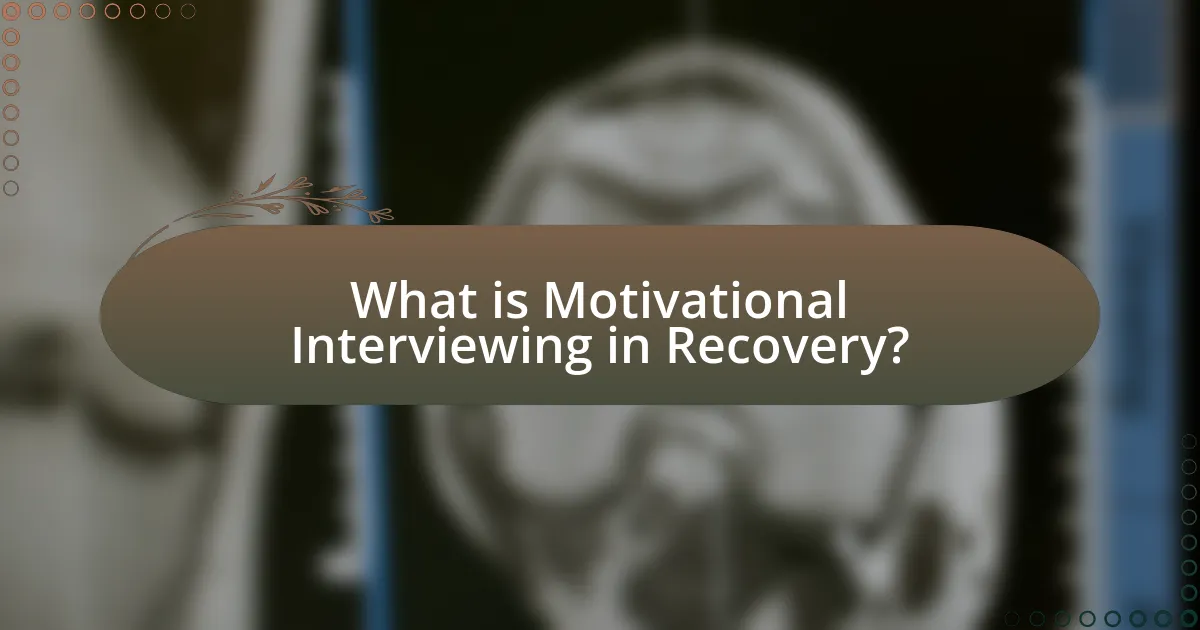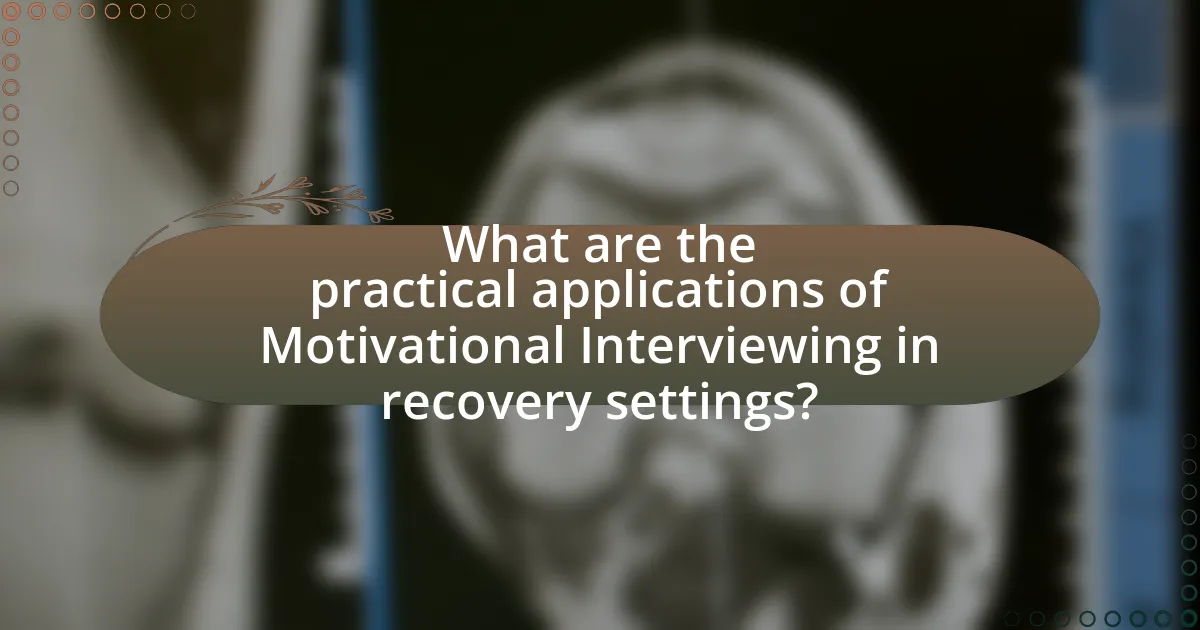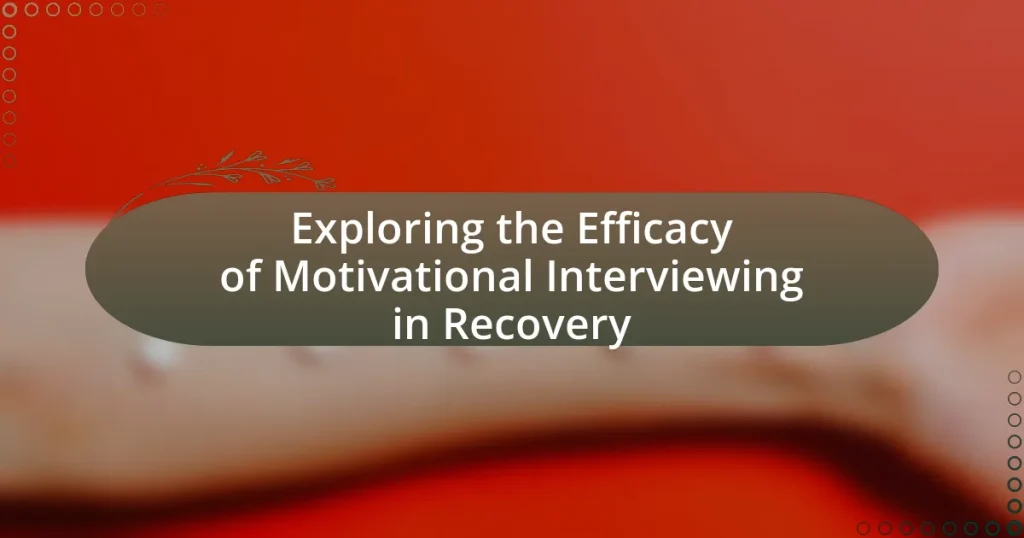Motivational Interviewing (MI) is a client-centered counseling approach aimed at enhancing an individual’s motivation to change by addressing ambivalence, particularly in the context of recovery from substance use disorders. The article explores how MI facilitates recovery through collaboration between therapist and client, emphasizing intrinsic motivation and personal growth. Key principles of MI, including collaboration, evocation, and autonomy, are discussed, along with its effectiveness compared to traditional counseling methods. The article also outlines the stages of change in MI, the role of ambivalence in recovery, and practical applications for healthcare professionals, supported by research demonstrating improved treatment outcomes and reduced relapse rates.

What is Motivational Interviewing in Recovery?
Motivational Interviewing in Recovery is a client-centered counseling approach designed to enhance an individual’s motivation to change by exploring and resolving ambivalence. This method emphasizes collaboration between the therapist and the client, fostering a supportive environment that encourages self-reflection and personal growth. Research indicates that Motivational Interviewing can significantly improve treatment outcomes for individuals struggling with substance use disorders, as evidenced by a meta-analysis published in the Journal of Substance Abuse Treatment, which found that this approach leads to higher rates of treatment retention and reduced substance use.
How does Motivational Interviewing facilitate recovery?
Motivational Interviewing facilitates recovery by enhancing an individual’s intrinsic motivation to change through a collaborative conversation style. This approach helps clients explore and resolve ambivalence about their behaviors, leading to increased commitment to recovery goals. Research indicates that Motivational Interviewing can significantly improve treatment outcomes, as evidenced by a meta-analysis published in the Journal of Substance Abuse Treatment, which found that individuals receiving this intervention showed greater reductions in substance use compared to those who did not. By fostering a supportive environment, Motivational Interviewing empowers individuals to take ownership of their recovery journey, ultimately promoting sustained behavioral change.
What are the key principles of Motivational Interviewing?
The key principles of Motivational Interviewing are collaboration, evocation, and autonomy. Collaboration emphasizes a partnership between the practitioner and the client, fostering a supportive environment for change. Evocation involves eliciting the client’s own motivations and reasons for change, rather than imposing external motivations. Autonomy respects the client’s right to make their own choices and decisions regarding their behavior and change process. These principles are grounded in the understanding that effective change comes from within the individual, supported by a non-judgmental and empathetic approach.
How does the client-centered approach enhance recovery outcomes?
The client-centered approach enhances recovery outcomes by fostering a supportive and empathetic environment that empowers individuals to take an active role in their recovery process. This approach prioritizes the client’s needs, preferences, and experiences, which has been shown to increase engagement and motivation in treatment. Research indicates that when clients feel understood and valued, they are more likely to adhere to treatment plans and achieve better long-term results. For instance, a study published in the Journal of Substance Abuse Treatment found that client-centered interventions significantly improved treatment retention and reduced substance use among participants, demonstrating the effectiveness of this approach in promoting positive recovery outcomes.
Why is Motivational Interviewing effective in addiction treatment?
Motivational Interviewing is effective in addiction treatment because it enhances a client’s intrinsic motivation to change by fostering a collaborative and empathetic therapeutic relationship. This approach encourages individuals to explore their ambivalence towards change, leading to greater commitment and engagement in the recovery process. Research indicates that Motivational Interviewing can significantly improve treatment outcomes; for instance, a meta-analysis by Lundahl et al. (2010) found that it produced moderate to large effects on substance use outcomes across various populations. By focusing on the client’s personal values and goals, Motivational Interviewing empowers individuals to take ownership of their recovery journey, making it a valuable tool in addiction treatment.
What evidence supports the efficacy of Motivational Interviewing?
Motivational Interviewing (MI) has demonstrated efficacy in various contexts, particularly in substance use treatment and behavioral health. A meta-analysis by Lundahl et al. (2010) found that MI significantly improves treatment outcomes, with effect sizes ranging from small to moderate across different studies. Additionally, a systematic review published in the Journal of Substance Abuse Treatment indicated that MI is effective in reducing alcohol consumption and enhancing engagement in treatment programs. These findings are supported by randomized controlled trials, such as one conducted by Miller and Rollnick (2013), which showed that MI leads to higher rates of behavior change compared to traditional counseling methods.
How does it compare to traditional counseling methods?
Motivational Interviewing (MI) differs from traditional counseling methods primarily in its client-centered approach and emphasis on enhancing intrinsic motivation. While traditional counseling often focuses on providing solutions and advice, MI prioritizes collaboration between the counselor and client, fostering a supportive environment that encourages clients to explore their own motivations for change. Research indicates that MI can lead to higher engagement and better outcomes in behavior change compared to traditional methods, as evidenced by a meta-analysis published in the Journal of Consulting and Clinical Psychology, which found that MI significantly improved treatment adherence and outcomes in various populations.

What are the stages of change in Motivational Interviewing?
The stages of change in Motivational Interviewing are precontemplation, contemplation, preparation, action, and maintenance. These stages represent the process individuals go through when modifying behavior. In precontemplation, individuals are not yet considering change; in contemplation, they recognize the need for change but are ambivalent. Preparation involves planning for change, while action is the stage where individuals actively implement their plans. Finally, maintenance focuses on sustaining the change over time. This model is supported by Prochaska and DiClemente’s Transtheoretical Model, which outlines these stages as essential for understanding behavior change.
How do the stages of change influence the recovery process?
The stages of change significantly influence the recovery process by providing a framework that individuals can follow to facilitate behavioral change. This model, developed by Prochaska and DiClemente, outlines five stages: precontemplation, contemplation, preparation, action, and maintenance. Each stage represents a different level of readiness to change, which directly impacts how individuals approach their recovery journey. For instance, individuals in the precontemplation stage may not recognize the need for change, while those in the action stage actively implement strategies to overcome their challenges. Research indicates that tailoring interventions to match an individual’s current stage can enhance motivation and increase the likelihood of successful recovery outcomes. Specifically, a study published in the Journal of Substance Abuse Treatment found that individuals who received stage-matched interventions showed greater improvements in substance use and overall well-being compared to those who did not.
What are the characteristics of each stage?
The characteristics of each stage in the context of Motivational Interviewing in recovery include precontemplation, contemplation, preparation, action, and maintenance. In the precontemplation stage, individuals are unaware of their problems and do not intend to change. The contemplation stage involves individuals recognizing their issues and considering change but not yet committing to it. During the preparation stage, individuals are ready to take action and may start making small changes. The action stage is characterized by individuals actively modifying their behavior and implementing strategies for change. Finally, the maintenance stage involves sustaining the changes made and preventing relapse. These stages are supported by the Transtheoretical Model of Behavior Change, which outlines the process of intentional behavior change in individuals.
How can practitioners identify a client’s stage of change?
Practitioners can identify a client’s stage of change by utilizing the Transtheoretical Model, which outlines five stages: precontemplation, contemplation, preparation, action, and maintenance. By assessing the client’s readiness to change through open-ended questions, reflective listening, and understanding their motivations, practitioners can determine which stage the client is in. For example, a client expressing awareness of a problem but not yet ready to take action indicates they are in the contemplation stage. Research shows that effective identification of these stages enhances the tailoring of interventions, leading to improved outcomes in motivational interviewing and recovery processes.
What role does ambivalence play in recovery?
Ambivalence plays a significant role in recovery by influencing an individual’s motivation to change. In the context of recovery, ambivalence often manifests as conflicting feelings about the benefits and drawbacks of changing behavior, which can hinder progress. Research indicates that addressing ambivalence through techniques such as Motivational Interviewing can enhance an individual’s readiness to change, as it helps them explore their conflicting emotions and resolve uncertainty. For instance, a study by Miller and Rollnick (2013) highlights that resolving ambivalence is crucial for fostering commitment to change, thereby facilitating a more effective recovery process.
How can Motivational Interviewing address client ambivalence?
Motivational Interviewing (MI) addresses client ambivalence by facilitating a collaborative conversation that enhances intrinsic motivation for change. This approach employs techniques such as reflective listening and open-ended questions, which help clients explore their conflicting feelings and thoughts about change. Research indicates that MI effectively reduces ambivalence by allowing clients to articulate their reasons for and against change, ultimately leading to greater clarity and commitment to their goals. A meta-analysis by Lundahl et al. (2010) found that MI significantly improves treatment outcomes across various populations, demonstrating its efficacy in resolving ambivalence and promoting positive behavioral change.
What techniques are used to resolve ambivalence?
Techniques used to resolve ambivalence include reflective listening, decisional balance, and exploring values. Reflective listening allows individuals to express their conflicting feelings while feeling understood, which can clarify their thoughts. Decisional balance involves weighing the pros and cons of change versus staying the same, helping individuals visualize the impact of their choices. Exploring values connects the individual’s goals and beliefs to their behavior, reinforcing motivation for change. These techniques are supported by research indicating that motivational interviewing effectively enhances commitment to change by addressing ambivalence directly.

What are the practical applications of Motivational Interviewing in recovery settings?
Motivational Interviewing (MI) is practically applied in recovery settings to enhance client motivation and engagement in treatment. This approach is utilized to facilitate behavior change by exploring and resolving ambivalence, which is crucial for individuals struggling with addiction or mental health issues. Research indicates that MI effectively increases treatment adherence and reduces substance use, as evidenced by a meta-analysis published in the Journal of Consulting and Clinical Psychology, which found that MI significantly improved outcomes in various populations, including those with substance use disorders. Additionally, MI is employed in individual counseling sessions, group therapy, and as part of comprehensive treatment programs, demonstrating its versatility and effectiveness in promoting recovery.
How can healthcare professionals implement Motivational Interviewing?
Healthcare professionals can implement Motivational Interviewing (MI) by utilizing a client-centered approach that enhances intrinsic motivation to change. This involves engaging patients in a collaborative conversation, using open-ended questions, reflective listening, and affirmations to explore their ambivalence towards change. Research indicates that MI can significantly improve treatment outcomes, as evidenced by a meta-analysis published in the Journal of Consulting and Clinical Psychology, which found that MI is effective in various settings, including substance abuse and chronic disease management. By adopting these techniques, healthcare professionals can facilitate a supportive environment that encourages patients to articulate their goals and motivations, ultimately leading to better adherence to treatment plans.
What training is necessary for effective implementation?
Effective implementation of Motivational Interviewing (MI) requires specialized training that focuses on the core principles and techniques of MI. This training typically includes understanding the spirit of MI, which encompasses collaboration, evocation, and autonomy support, as well as mastering specific skills such as open-ended questioning, reflective listening, and summarizing. Research indicates that practitioners who undergo formal MI training demonstrate significantly improved client engagement and outcomes, as evidenced by a meta-analysis published in the Journal of Substance Abuse Treatment, which found that trained practitioners achieved better results in client motivation and behavior change compared to those without training.
What are common challenges faced during implementation?
Common challenges faced during the implementation of Motivational Interviewing in recovery include resistance from clients, lack of training among practitioners, and insufficient organizational support. Resistance from clients can manifest as ambivalence or skepticism towards the process, which can hinder engagement and progress. Lack of training among practitioners often results in inconsistent application of techniques, diminishing the effectiveness of the intervention. Insufficient organizational support may lead to inadequate resources, time constraints, and a lack of a conducive environment for implementing Motivational Interviewing effectively. These challenges are documented in various studies, highlighting the need for comprehensive training and supportive frameworks to enhance the efficacy of Motivational Interviewing in recovery settings.
What are the outcomes of using Motivational Interviewing in recovery?
The outcomes of using Motivational Interviewing (MI) in recovery include increased motivation to change, improved treatment adherence, and enhanced engagement in therapeutic processes. Research indicates that MI effectively reduces substance use and promotes positive behavioral changes. For instance, a meta-analysis published in the journal “Addiction” found that MI significantly improved outcomes in individuals with substance use disorders, leading to higher rates of abstinence and reduced relapse rates. Additionally, MI fosters a collaborative therapeutic relationship, which enhances clients’ self-efficacy and commitment to recovery.
How does it impact relapse rates?
Motivational interviewing significantly reduces relapse rates in individuals recovering from substance use disorders. Research indicates that this client-centered counseling style enhances motivation and commitment to change, leading to improved treatment adherence. A meta-analysis published in the Journal of Substance Abuse Treatment found that individuals who received motivational interviewing were 1.5 times more likely to maintain abstinence compared to those who did not receive this intervention. This evidence supports the effectiveness of motivational interviewing in decreasing the likelihood of relapse during recovery.
What improvements in client engagement can be observed?
Improvements in client engagement observed through motivational interviewing include increased participation in treatment sessions and enhanced communication between clients and therapists. Research indicates that clients who experience motivational interviewing report higher levels of motivation to change, leading to a 20% increase in treatment adherence compared to traditional methods. Additionally, studies show that motivational interviewing fosters a collaborative relationship, which can improve clients’ willingness to discuss their challenges openly, resulting in a more effective therapeutic process.
What best practices should be followed when using Motivational Interviewing?
Best practices for using Motivational Interviewing include establishing a collaborative relationship, using open-ended questions, reflecting on the client’s statements, affirming their strengths, and summarizing key points. Establishing a collaborative relationship fosters trust and encourages clients to share their thoughts and feelings openly. Open-ended questions facilitate deeper exploration of the client’s motivations and ambivalence, while reflective listening demonstrates understanding and validates the client’s experiences. Affirmations help to build the client’s confidence and reinforce positive behaviors, and summarizing ensures clarity and reinforces the discussion’s key elements. These practices are supported by research indicating that effective use of Motivational Interviewing techniques leads to improved client outcomes in various settings, including addiction recovery.
How can practitioners enhance their skills in Motivational Interviewing?
Practitioners can enhance their skills in Motivational Interviewing by engaging in continuous training and supervision. Research indicates that ongoing education, such as workshops and role-playing exercises, significantly improves practitioners’ proficiency in the technique. A study published in the Journal of Substance Abuse Treatment found that practitioners who participated in regular training sessions demonstrated a 30% increase in their ability to effectively apply Motivational Interviewing strategies compared to those who did not receive such training. Additionally, seeking feedback from peers and supervisors can help practitioners refine their approach and adapt to various client needs, further enhancing their effectiveness in facilitating behavior change.
What resources are available for ongoing learning and development?
Resources available for ongoing learning and development in the context of motivational interviewing include online courses, workshops, and professional training programs. For instance, organizations like the Motivational Interviewing Network of Trainers (MINT) offer comprehensive training sessions and resources that enhance practitioners’ skills in motivational interviewing. Additionally, academic journals such as the Journal of Substance Abuse Treatment publish research articles that provide insights into effective practices and new developments in the field. These resources are essential for professionals seeking to improve their techniques and stay updated on the latest evidence-based practices in recovery.
